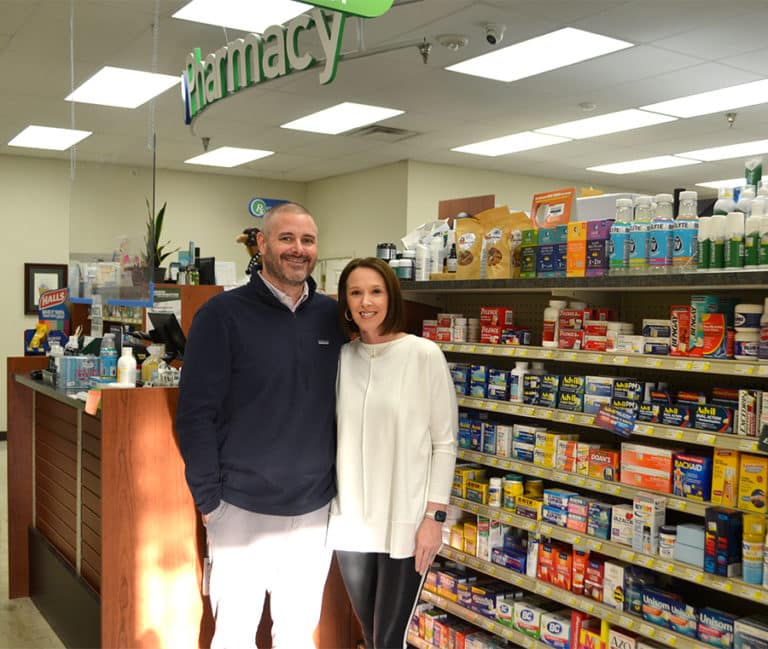Photo: Owners and pharmacists Scott and Kelli Cornelius pose for a photo in Rick’s Drugs. (Emma Kirkemier/Messenger)
By Emma Kirkemier, News Editor
Rick’s Drugs has been a staple in the Attalla community since its founding in 1976.
However, when founder and owner Rick Bearden retired in 2021, he left the business in the capable hands of Scott and Kelli Cornelius.
The married couple are both licensed pharmacists, and together, they are living out their collective dream of owning a small, independent pharmacy.
“The Lord kind of worked it out,” said Kelli Cornelius. “It worked out in a situation where Rick was ready to retire, (and) Scott had been here for many years where he had met all the patients. It felt like it was kind of laid out. He had so many years to get to know the patients. They’re very comfortable with him, so they’re not in a panic mode that there’s new ownership, that things might change. I just feel like it’s been a smooth transition.”
The couple bought into the business in 2019, purchasing shares equal to 50 percent, with Bearden holding the other 50. In 2021, they bought Bearden’s shares as well, making them the sole owners.
The pharmacy offers local delivery to its customers, as well as drive-thru access to drop off and pick up prescriptions, an array of over-the-counter products, vaccinations and health screenings.
Being physically connected to the Attalla Johnson’s Giant Food has been a benefit for Rick’s Drugs and its customers, who often choose to grocery shop while waiting for their prescriptions to be filled.
Scott Cornelius grew up in Decatur, while Kelli grew up in Gadsden, but the two met in pharmacy school at Auburn University. Kelli got to know Bearden after her graduation in 2002, filling in part-time at Rick’s Drugs so Bearden could spend time with his granddaughter.
Bearden learned through Kelli that her husband, Scott, would also be graduating pharmacy school soon. So, in 2003, Bearden hired Scott at Rick’s Drugs, where he has remained for nearly 20 years.
Although Kelli was employed elsewhere in the following years, the couple maintained a close relationship with Bearden. Their sons, identical twins named Colton and Brodie, were born in 2005.
“When I had children, I only worked two days a week, so that was nice — or sometimes just one day a week, depending on what we needed,” Kelli said. “It’s a great job to be a (parent). It’s flexible. I was still able to work and kind of stay in the mix of knowing what’s going on. If I had just quit, I might not have ever come back. You get so far behind, just education-wise and keeping up with the latest drugs. There’s always something new coming out.”
Both Cornelius’s agreed that they “learn something new every day.”
“The pharmacy world is always evolving, always changing,” said Scott. “Luckily, we have to get continuing education hours every year, so you hear stuff coming down the pipeline. But (it’s still a learning curve).”
In addition to a dynamic medicinal landscape, Rick’s Drugs had to reevaluate the ways it provided services during the COVID-19 pandemic.
Scott explained that the pharmacy has had a drive thru for years, but the biggest change was in offering curbside service for medicines and vaccines alike. He frequently went to patients’ cars in the parking lot to administer COVID-19 vaccines.
The couple fulfills many different roles in the pharmacy, balancing business and clinical duties.
“It helps that we’re both pharmacists,” Scott said. “At some point if one of us needs to step away during the day to do something, then we don’t have to close the store. It can still keep moving along. The business aspect does occupy more of our time as far as managing inventory purchases, watching prices, things of that nature.”
Kelli explained that managing people can be a daunting task, so she is grateful for their exemplary employees.
“We have a very good staff,” she said. “Honestly, we couldn’t do it without them, because they know how things need to be run, and they’re very good.”
She said the turnover rate is low and almost exclusively caused by employees leaving the area to pursue higher education, like college or nursing school. One employee, Apryl Jackson, has been at Rick’s Drugs since 1995. Even Bearden, who has been retired since 2021, will fill in when needed.
According to Scott, he and Kelli have both been interested in pharmacy since their high school years. Kelli cut her proverbial teeth at Knight’s Pharmacy in Gadsden, and then during her college years at Jerry’s Pharmacy in Alabama City. Scott did the same at Payless Express Pharmacy of Decatur.
Knight’s Pharmacy was Kelli’s first job, and Scott was convinced by the head of his school’s co-op program to help out at the local store.
“I just always enjoyed, at that time, meeting people and getting to know people,” Kelli said. “It was just kind of the (friendliness that I enjoyed).”
Scott quickly discovered his love of working with the public, and during the COVID-19 pandemic, Rick’s Drugs worked to protect its community by providing vaccines and medicine.
“We did keep our doors open (during the COVID-19 pandemic), so we were able to still service everyone and give them their medicine,” Kelli said. “And then we had the opportunity to meet I don’t know how many people giving the COVID vaccine — people from all over the area, not just Attalla.”
Growing their business, to the Cornelius’s, comes with building relationships and rapport within their community.
“It’s all because of the relationships,” Scott said. “When you go into the chain pharmacies, you might not see the same person twice in a row. Here you’re going to go in, you’re going to see a familiar face. It all goes back to relationships. You get to know the person.”
Kelli claims that earning customers’ trust also goes back to forming relationships.
“(Scott is) very good at being a face of the business,” she said. “People are very familiar with him, because he’s been around for a while. People love talking with him. When they were getting vaccines and things, they’d love to chat.”
Kelli prefers not to give vaccines herself, leaving that to her husband in accordance with their divide-and-conquer strategy.
“We know what we’re good at, so it allows us to work together without causing issues,” Kelli said. “I think that’s what makes it successful.”
While Kelli tends to stay with the pharmacy, Scott often travels to local businesses and city halls to administer vaccines for the employees there. He is also certified to provide wellness screenings for state and local government employees at the pharmacy.
“Wellness screenings are four basic things,” he explained. “They’re checking blood pressure, cholesterol, blood sugar and doing their height and their weight, checking for their BMI.”
According to Scott, businesses and state employers who participate can sometimes save money on health insurance by providing this preventative care. Employees who participate are also sometimes eligible for discounted insurance premiums.
Both attested to the diversity of services that they offer, which may fluctuate with the seasons. During flu season, for example, the pharmacy usually gives more immunizations. Summers tend to see fewer infections, allowing them to focus more on things like medication management — helping the patient gain a comprehensive understanding of the maintenance medications they take, what each does, whether the medicines interact and how to manage side-effects.
“If there’s any talking points on certain medications — like you need to take it with food, take it with water, take it in the morning, take it separate from other things — we go over all that and answer any questions they have,” Scott said.
The Cornelius’s said that owning a business together can be taxing — sometimes it is difficult not to take work home — but it is rewarding and a dream job for both.
“I think we have a unique story or a neat story, from meeting in pharmacy school,” Kelli said. “Even being in different classes, we met because they made all of the classes — like a freshman, sophomore, junior, senior — kind of merge and try to meet, and we actually ended up in the same group. I just think it’s neat. I was just thankful that we got to come back to my hometown because my family’s here: my mom and my dad, even my grandmother’s still alive. They’ve always helped me with our kids, which has made it where I can continue to work. We were blessed, and we really have no complaints.”





